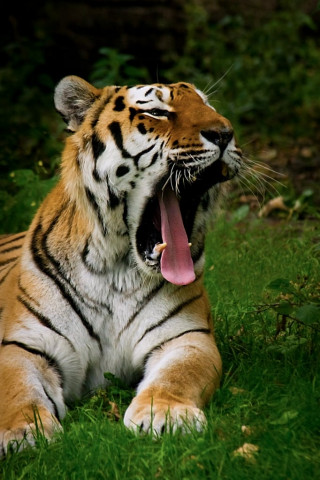Wildlife Day: ‘Community mobilisation can help save wildlife’
‘There is need to reduce demand for animal products’.

File photo of a tiger. PHOTO: FILE
“The earth’s wild creatures – from the tiger to the monarch butterfly – bring wonder and beauty into our lives. They are also a vital part of the forests, meadows, rivers and oceans on whose services our economy and society depend. Wildlife needs our appreciation and protection,” WWF International Director General Jim Leape said on Monday in connection with the World Wildlife Day.
The United Nations General Assembly set aside March 3 to raise awareness of the intrinsic value of wildlife and its contributions to sustainable development and human well-being. The day marks the signing of the Convention on International Trade in Endangered Species of Wild Fauna and Flora (CITES) in 1973.

WWF-Pakistan has been working to conserve wildlife in the country for the past 44 years. WWF-Pakistan Director General Ali Habib said, “Our priorities are the Indus dolphin, Gyps vulture, common leopard and the snow leopard, and marine and freshwater turtles. We support action to save other wildlife species including hog deer, ibex, urial, markhor, marmots, black bears, and smooth-coated otters. Community mobilisation and empowerment are some of our key strategies to prevent illegal poaching and hunting.”
Habib said it was imperative to highlight the importance of conservation among communities that lived in proximity to wildlife habitats. “It is also imperative to highlight wildlife crime and rally legal support against those who kill endangered animals for profit and destroy the livelihoods of thousands of honest people.”
WWF-Pakistan Biodiversity Director Uzma Khan said, “Trading wild animals is a crime...it damages species and habitats and negatively impacts the livelihoods of local communities.” She said freshwater turtles and pangolins were disappearing fast because of illegal trade. Wild animals also end up at private collections...this is criminal, she said. “We need to act responsibly by reducing the demand of products made from wild animals, such as shahtoosh shawls, ivory decoration pieces or python skin hand bags. They have blood on them.”
The WWF-Pakistan has also initiated a programme to protect marine life and plants facing threats.
Several steps have been taken to create awareness among stakeholders.
Efforts have been made to help save threatened species like whale sharks and marine turtles.
Following a series of trainings conducted by the WWF-Pakistan, several fishermen have released a large number of enmeshed whale sharks and marine turtles from their fishing gears.
Published in The Express Tribune, March 4th, 2014.



















COMMENTS
Comments are moderated and generally will be posted if they are on-topic and not abusive.
For more information, please see our Comments FAQ